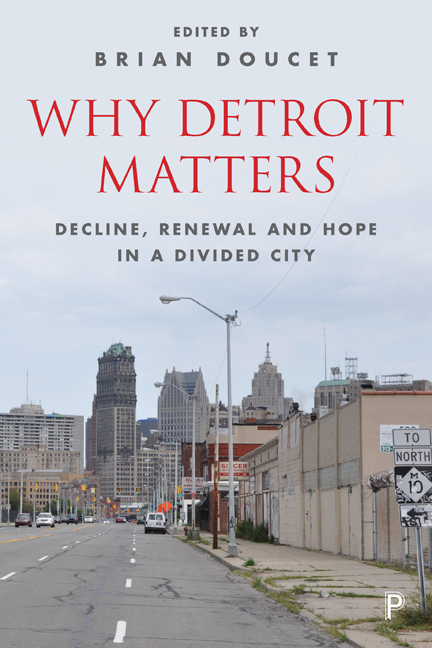Book contents
- Frontmatter
- Contents
- List of contributors
- List of figures and tables
- Acknowledgments
- one Introduction: why Detroit matters
- Section One Lessons from Detroit
- Intermezzo I You may not know my Detroit
- Section Two Practices from Detroit
- Intermezzo II My Detroit
- Section Three Conversations from Detroit
- References
- Index
six - Reshaping the gray spaces: resident self-provisioning and urban form in Detroit
Published online by Cambridge University Press: 05 April 2022
- Frontmatter
- Contents
- List of contributors
- List of figures and tables
- Acknowledgments
- one Introduction: why Detroit matters
- Section One Lessons from Detroit
- Intermezzo I You may not know my Detroit
- Section Two Practices from Detroit
- Intermezzo II My Detroit
- Section Three Conversations from Detroit
- References
- Index
Summary
After several chapters focusing on the context and structural forces shaping Detroit, we now shift toward understanding how residents live under such conditions. In Chapter Five, Joshua Akers critiqued current strategies of blight remediation. In this chapter, Kimberley Kinder examines strategies local residents employ to manage the disinvestment seen in their neighborhoods, including blight. Her chapter focuses on the concept of “do-it-yourself [DIY] urbanism.” Rather than celebrating this process, as others have done, Kinder situates the struggle of self-provisioning in wider national and global trends of economic restructuring and neoliberal policymaking. In contrast to Akers, Kinder demonstrates that purchasing foreclosed properties at auction is one of the DIY strategies used to help prevent further neighborhood decline.
Using examples from her vast empirical research, Kinder illustrates three ways in which DIY urbanism transforms the urban environment: rearranging people in space, renegotiating access to resources, and reshaping ethical norms. This last point is important because many DIY practices are illegal (such as entering into an abandoned home to remove items that might make it conducive for drug dealing). To deal with this, residents adopt a position of ethical relativism, which she defines as “conforming to locally negotiated rules of action that technically violated municipal law while nonetheless maintaining social legitimacy.”
DIY urbanism and self-provisioning are common practice for many Detroiters and a recurring theme throughout this book. The community garden of Wayne Curtis and Myrtle Thompson-Curtis (Chapter Twenty-two) or the work of the Detroit Black Community Food Security Network (Chapter Eighteen) provide fresh and healthy food to neighborhoods no longer served by grocers from mainstream capitalism; the Boggs School (Chapter Twenty-three) offers quality, place-based education in the absence of a strong local school district. Such initiatives fit within Grace Lee Boggs’ (Chapter Twenty-five) vision of revolution and share the idea that citizens and communities need to take power over their situation because the formal systems of government, services, and investment either do not exist or do not cater to their needs (for perspectives of how racism contributes to this, see the conversations with Malik Yakini, Chapter Eighteen, and Yusef Bunchy Shakur, Chapter Twenty-four). Kinder's chapter also reminds us that it is not just community leaders or activists who engage in DIY urbanism; ordinary residents are often central to these transformations.
- Type
- Chapter
- Information
- Why Detroit MattersDecline, Renewal and Hope in a Divided City, pp. 117 - 134Publisher: Bristol University PressPrint publication year: 2017



